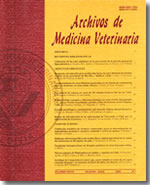Utilization of a monoclonal antibody in the diagnosis of infectious pancreatic necrosis virus in fish
Main Article Content
Abstract
The infectious pancreatic necrosis virus, IPNV, is the etiological agent of a highly contagious disease that affects young salmon. If they survive, they become carriers and can transmit the disease. To contribute to the fast and effective diagnosis in fish with the acute infection, as well as of carrier fish, the use of a monoclonal antibody in the detection of the virus in experimentally infected animals was studied. Rainbow trout (Oncorhynchus mykiss) and coho salmon (Oncorhynchus kisutch) fry infected with a Chilean IPNV isolate were used for the experience. To detect the viral antigens the ELISA immunodot and immunofluorescence methods were used.
The monoclonal antibody used allows the diagnosis of the virus in carriers in less than three days irrespective of whether the sample was obtained from a fish with the acute disease or from carrier fish. In the first case the ELISA and immunodot methods can be applied directly on extracts of whole fish. In the second, the extracts of the carrier fish organs should be amplified during one and a half-day in cultured cells before performing the assays. It was determined also that the time required for IPNV diagnosis in carrier fish can be further shortened if the monolayers were examined for specific immunofluorescence in the infected cells. Additionally, it was proved that carrier fish can be easily detected by means of the direct staining of imprints of organs of suitably sized fish.

